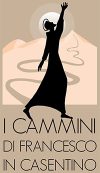Menu
The Cantar Maggio is a traditional event in the village of Badia Prataglia, located on the Via di Francesco pilgrimage trail.
Celebrated on the night of April 30th every year, this event marks the arrival of spring and ushers in the harvest season.
The village’s youth dress in colorful plaid and hats, and go from house to house, singing traditional songs accompanied by the guitar.
The songs are intended to bring good fortune for the harvest and love, while also carrying a curse if families don’t offer compensation in the form of agricultural products such as eggs, cheese, or wine.
This centuries-old ritual is still practiced today, preserving a unique piece of Tuscany’s rural culture and heritage.
Cantar Maggio has been a popular folkloric rite in Tuscany for centuries, celebrating the arrival of spring and the harvest season.
This tradition is deeply rooted in the rural and agricultural cultures of the region, and is still practiced today in many areas of Tuscany, including Badia Prataglia.
In recent times, however, the ritual has faced the risk of losing its original characteristics or disappearing altogether.
Cantar Maggio remains an important representation of Tuscany’s cultural history and a unique opportunity for visitors to experience the region’s rich heritage.
Full song in Italian:
Ben trovata signoria
la veniamo a salutare,
la veniamo a salutare.
Ecco Maggio in compagnia
che fa il mondo rallegrare,
che fa il mondo rallegrare.
Rilucente, chiara stella
risplendente come il sole
della Vergine Sorella
della Madre del Signore.
Ragazzine che voi state
vagheggianti alle finestre,
vostre chiome sono queste,
vostre trecce ghirlandose,
Ecco Maggio in gigli erose.
Siamo giunti in questa casa
dove l’è sibella dama,
dove l’è si bella dama.
Fra di noi c’è un che vi ama
e di più vi ha dato il cuore
è il “nome innamorato” il vostro amore.
E di più il cuor vi ha dato
è la “nomeinnamorata” innamorata.
Ecco maggio giù della Tavola pel piano
l’è fiorito l’orzo e il grano,
l’è fiorito l’orzo e il grano.
Ecco maggio giù pel poggio
l’è fiorito il grano e l’orzo,
l’è fiorito il grano e l’orzo.
Se le uova ce le date
pregherem per le galline,
pregherem per le galline,
che non vengano mangiata
dalle volpi e le faìne,
dalle volpi e le faine.
E se non ci date niente
ringraziamo ugualmente,
ringraziamo ugualmente.
Fate presto brava gente
che c’abbiam da camminare,
che c’abbiam da camminare.
In altre parti abbiam da andare
a cantare allegramente
Ecco Maggio o brava gente.
Full translation in English:
Well met, lords and ladies
we come to greet you,
we come to greet you.
Behold May in company
that makes the world rejoice,
that makes the world rejoice.
Shining, bright star
radiant like the sun
of the Virgin Sister
of the Mother of the Lord.
Young girls who are
gazing out the windows,
your locks are these,
your braided garlands,
Behold May in blooming lilies.
We have arrived at this house
where there is such a beautiful lady,
where there is such a beautiful lady.
Among us, there is one who loves you
and has given you his heart
is the “in love name” your love.
And he has given you his heart
is the “in love name” in love.
Behold May down the flat Table
barley and wheat have bloomed,
barley and wheat have bloomed.
Behold May down the hill
wheat and barley have bloomed,
wheat and barley have bloomed.
If you give us eggs
we will pray for the hens,
we will pray for the hens,
that they are not eaten
by foxes and martens,
by foxes and martens.
And if you give us nothing
we thank you anyway,
we thank you anyway.
Hurry up, good people
because we have to walk,
because we have to walk.
In other places, we have to go
to sing joyfully
Behold May, good people.
By entering your email, you get the Quick Start emails, free Pilgrim Essentials Kit, and more resources, and agree to our Terms & Conditions and Privacy Policy.

An opportunity for pilgrims, seekers, and adventurers to take an inward journey alongside the spirit of St Francis.

A Toscana, non-religious non-profit to share the discovery and preservation of Franciscan tradition, Nature, and Art.
Disclosure: We may receive affiliate compensation for some of the links on this site if you decide to purchase linked items, helping us to maintain our trails and provide services to our community of pilgrims. Read our affiliate disclosure in our privacy policy.
By entering your email, you get the Quick Start emails, free Pilgrim Essentials Kit, and more resources, and agree to our Terms & Conditions and Privacy Policy.

An opportunity for pilgrims, seekers, and adventurers to take an inward journey alongside the spirit of St Francis.

A Toscana, non-religious non-profit to share the discovery and preservation of Franciscan tradition, Nature, and Art.
Disclosure: We may receive affiliate compensation for some of the links on this site if you decide to purchase linked items, helping us to maintain our trails and provide services to our community of pilgrims. Read our affiliate disclosure in our privacy policy.